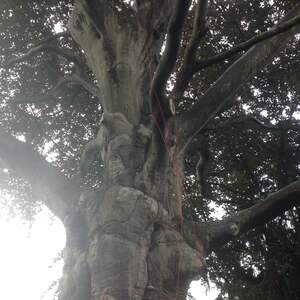100 signatures reached
To: Mendip District Council
Save Frome Copper Beech

Please do not fell the copper beech in St John's churchyard.
The risk to public safety can be minimised by proper management of the tree, in recognition of its immense value for local wildlife, culture and beauty.
The risk to public safety can be minimised by proper management of the tree, in recognition of its immense value for local wildlife, culture and beauty.
Why is this important?
The iconic copper beech in St. John's churchyard is scheduled to be felled ASAP.
Recent survey work has found increasing levels of decay, and Mendip District Council health and safety have decided they would rather fell the tree to avoid liability, than manage it properly.
There are several options which could be considered, including further crown reductions, excluding access to prevent soil compaction, and applying mulches to improve root growth.
Hollow trees are very common. As trees become older, hollows or cavities can form due to a variety of factors - often through the work of fungi.
This is a natural part of the life of a tree. Hollow trees can continue to live for a long time despite having large central cavities, and this does not usually cause them to become dangerous.
This report from the Woodland Trust has lots of useful information about hollow trees. http://goo.gl/FTSF4E The report states: "Hollowing trees are also not necessarily structurally unsound, indeed the great storm of 1987 showed hollow trees may be as strong, if not stronger, than younger solid trees because they are more flexible."
Hollow trees provide a fantastic and declining habitat for wildlife species including bats, birds and invertebrates. These important ecosystems are becoming more and more rare, partly because of the over-cautious felling of trees as they reach this life stage and begin to show evidence of decay.
This iconic tree is a landmark feature of Frome. Though surveys have found the decay in the trunk is significant, the tree appears outwardly healthy and is in a sheltered location. Felling the tree now would be over-cautious, and would be a tragedy for Frome.
Recent survey work has found increasing levels of decay, and Mendip District Council health and safety have decided they would rather fell the tree to avoid liability, than manage it properly.
There are several options which could be considered, including further crown reductions, excluding access to prevent soil compaction, and applying mulches to improve root growth.
Hollow trees are very common. As trees become older, hollows or cavities can form due to a variety of factors - often through the work of fungi.
This is a natural part of the life of a tree. Hollow trees can continue to live for a long time despite having large central cavities, and this does not usually cause them to become dangerous.
This report from the Woodland Trust has lots of useful information about hollow trees. http://goo.gl/FTSF4E The report states: "Hollowing trees are also not necessarily structurally unsound, indeed the great storm of 1987 showed hollow trees may be as strong, if not stronger, than younger solid trees because they are more flexible."
Hollow trees provide a fantastic and declining habitat for wildlife species including bats, birds and invertebrates. These important ecosystems are becoming more and more rare, partly because of the over-cautious felling of trees as they reach this life stage and begin to show evidence of decay.
This iconic tree is a landmark feature of Frome. Though surveys have found the decay in the trunk is significant, the tree appears outwardly healthy and is in a sheltered location. Felling the tree now would be over-cautious, and would be a tragedy for Frome.
How it will be delivered
This seems like a done deal, there is no option for consultation.
Please share this widely and we can deliver it to MDC shortly.

